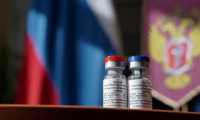-
Spain’s annual life expectancy at birth dropped due to COVID-19 pandemic
- Source: drugdu
- 343
- November 12, 2020
-
PFIZER AND BIONTECH ANNOUNCE VACCINE CANDIDATE AGAINST COVID-19 ACHIEVED SUCCESS IN FIRST INTERIM ANALYSIS FROM PHASE 3 STUDY
- Source: drugdu
- 1,237
- November 10, 2020
-
Remdesivir becomes first Covid-19 treatment to receive FDA approval
- Source: drugdu
- 245
- October 23, 2020
-
Russia approves a second vaccine
- Source: drugdu
- 377
- October 19, 2020
-
Blocking Immune System Pathway Could Stop COVID-19 Infection, Finds Study
- Source: drugdu
- 293
- October 15, 2020
-
Natural COVID-19 Infection Produces Robust T Cell Response and Memory to Fight Future Infections, Finds Study
- Source: https://www.hospimedica.com/covid-19/articles/294784403/natural-covid-19-infection-produces-robust-t-cell-response-and-memory-to-fight-future-infections-finds-study.html
- 233
- September 9, 2020
-
Oversensitive COVID-19 Tests Detecting Dead Coronavirus Cells, Driving False Positives and Reinfections
- Source: https://www.hospimedica.com/covid-19/articles/294784371/oversensitive-covid-19-tests-detecting-dead-coronavirus-cells-driving-false-positives-and-reinfections.html
- 190
- September 9, 2020
-
Antiviral Used to Treat Coronavirus in Cats Very Likely to Be Effective Drug for COVID-19 Patients
- Source: https://www.hospimedica.com/covid-19/articles/294784252/antiviral-used-to-treat-coronavirus-in-cats-very-likely-to-be-effective-drug-for-covid-19-patients.html
- 183
- September 1, 2020
-
How a virus might protect against skin cancer
- Source: drugdu
- 205
- November 25, 2019
-
How a virus might protect against skin cancer
- Source: drugdu
- 210
- November 19, 2019
your submission has already been received.
OK
Subscribe
Please enter a valid Email address!
Submit
The most relevant industry news & insight will be sent to you every two weeks.









